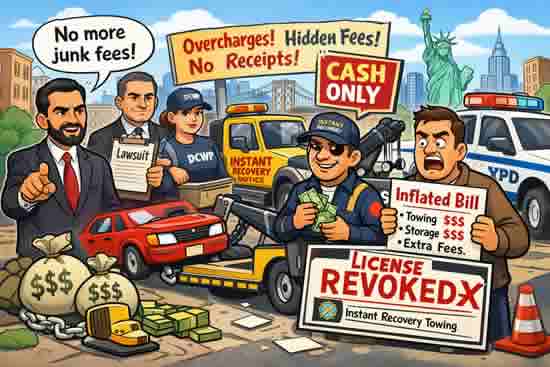Under Governor Hochul’s Leadership New York has Distributed Opioid Settlement Funds To Impacted Communities Faster Than Any Other State
$6 Million Investment Supporting Mobile Medication Units in High-Needs Areas
$20 Million Investment Supporting Development & Training for Addiction Services Specialists
Governor Kathy Hochul highlighted New York State as a national leader in combatting the devastating effects of opioid addiction, leading the nation in providing opioid settlement funding directly to impacted communities statewide. Under Governor Hochul’s leadership, New York has distributed opioid settlement funds to impacted communities faster than any other state. Recent actions to address the opioid and overdose crisis include ensuring all $192 million in first-Year Opioid Settlement Funds were allocated by August 2023. Throughout the past year, New York State, led by the Office of Addiction Services and Supports and Department of Health, has distributed hundreds of millions of dollars to support a full continuum of prevention, treatment, harm reduction, and recovery services designed to increase access to help and support in every area of the state.
“I know how devastating it is watching a loved one navigate addiction, and how important it is to expand and enhance these services so that everyone is able to access the help and support they need,” Governor Hochul said. “We are distributing historic amounts of funding to address this crisis, including through the opioid settlement fund, which is allowing us to hold opioid manufacturers and distributors responsible for the role they have played in this crisis.”
Preliminary data shows more than 6,300 overdose deaths in New York State in 2022, with opioids involved in more than three-quarters of those deaths. To address this crisis, New York State is continuing to expand and enhance services to every area of the state, allowing all New Yorkers to access individualized services that best meet their needs.
New York Attorney General Letitia James said, “The opioid crisis has devastated families and communities throughout New York state. I am proud to use the powers of my office to hold those who contributed to this social scourge accountable, and secure vital funds to heal our communities with resources for recovery, prevention, and treatment. The money secured by my office and disbursed by Governor Hochul will enable the state to address the crisis and also fend off emerging threats like xylazine-laced fentanyl and other dangerous drugs. I am proud to partner with the Governor and her administration to help rebuild our families, communities, and state.”
OASAS Commissioner Dr. Chinazo Cunningham said, “We remain in the worst overdose crisis ever, and New York State is taking decisive, concrete steps to help individuals, families, and communities that have been impacted. These initiatives are supporting a full continuum of addiction services across the state and helping increase access to services for all New Yorkers, allowing us to meet them where they are with individualized, person-centered services that support their overall health.”
State Health Commissioner Dr. James McDonald said, “New York State continues to lead the way in responding to the opioid epidemic, which has had devastating impact on families across the state. We know that prevention, treatment, harm reduction, and recovery services are saving lives every day. I thank Governor Hochul for her leadership and enduring commitment to advancing these critical initiatives and comprehensive programs.”
New York State Office of Mental Health Commissioner Dr. Ann Sullivan said, “The overdose crisis has had a tragic impact on our communities across the state. By providing a full array of services and supports, we can help New Yorkers overcome barriers to needed care and receive assistance to live successfully in their community. Governor Hochul’s commitment to building out these evidence-based programs is providing us the resources to strengthen culturally relevant integrated harm reduction and treatment services that will help us address the opioid crisis head on.”
Opioid Settlement Funding
In late October 2023, Governor Hochul announced that New York is leading the country with the pace and volume at which it is getting opioid settlement funding to organizations and local governments providing services in their communities. To date, New York State has made available all $192.8 Million available from the first year of settlement agreements with opioid manufacturers. This funding is supporting a variety of prevention, treatment, harm reduction, and recovery initiatives to help New Yorkers impacted by the opioid and overdose crisis.
Initiatives supported through this funding include support for local governments, funding for supportive housing programs, expansions to treatment, including facilitating easier access to medication for addiction treatment (MAT) and other comprehensive addiction services, funding for recovery initiatives including recovery centers, outreach and engagement services to connect high-need individuals and populations with harm reduction and treatment services, prevention programs, and support for syringe exchange programs, drug user health hubs, increased telemedicine services particularly in rural areas of NYS, and the provision of harm reduction services to priority populations such as Black, Indigenous, and People of Color (BIPOC), LGBTQ+, formerly incarcerated individuals, pregnant and parenting individuals, veterans, older adults and adolescents who use drugs. Additional information about these and other initiatives, and the status of settlement fund spending is available on the Opioid Settlement Fund Tracker on the OASAS website.
New York State is receiving more than $2 Billion through various settlement agreements with opioid manufacturers and pharmaceutical companies that were secured by Attorney General Letitia James. A portion of the funding from these settlements will go directly to municipalities, with the remainder deposited into a dedicated fund to support prevention, treatment, harm reduction, and recovery efforts to address the ongoing opioid epidemic.
The same legislation that established the dedicated fund also created the Opioid Settlement Fund Advisory Board, which is tasked with making recommendations on how settlement dollars should be allocated to best serve those in need. Board members issued their first recommendations on November 1, 2022, identifying the expansion of harm reduction services and treatment as top priorities. The Board issued its second report on November 1, 2023.
Mobile Medication Units
In 2023, the first Mobile Medication Units (MMUs) began operation. These programs provide medication assessment, administration, and testing services to people in their own communities, and are designed to reach those who face barriers accessing brick-and-mortar locations. There are currently two operational MMUs in New York City, with several more set to begin operation statewide in the coming months.
OASAS has awarded $5.5 million in federal Substance Abuse Prevention and Treatment (SAPT) supplemental funds to support the development of these programs across the state. MMUs offer services that include admission assessments and medication induction, medication administration and observation, toxicology tests, and other medical services. The development of MMUs is made possible by a DEA rule change, allowing them to be operated by existing Opioid Treatment Program (OTP) providers.
Overdose Prevention
In the last year, the OASAS launched a new online ordering system for fentanyl test strips, xylazine test strips, and naloxone. More than 3.2 million fentanyl test strips and 2.9 million xylazine test strips have been ordered across the state through this initiative. These lifesaving resources are available to all New Yorkers, free of charge. The State Health Department has also distributed 873,000 fentanyl test strips and 340,000 xylazine test strips in the last year.
The State Health Department has the most comprehensive overdose prevention program in the country, with more than 1,000 registered programs and 5,155 overdose prevention sites. In 2023, 404,592 naloxone kits were distributed by these programs. Through the above-mentioned OASAS online ordering mechanism, an additional 70,000 naloxone kits have been distributed. For those looking to learn how to use naloxone, OASAS offers virtual naloxone trainings, which are open to the public, and educate individuals on how to recognize an overdose, respond by administering naloxone, and what to do after naloxone is given.
Of additional significance, in September 2023, under Governor Hochul, major commercial pharmacies began carrying the medication both online and in stores, as the FDA approved over the counter naloxone.
In May 2023, the State Department of Health’s Office of Drug User Health established four drug checking programs operated by Department-funded Drug User Health Hubs. This care initiative is providing information to individuals on the content of their drugs. The current programs are located in the Southern Tier, Central New York, the Capital Region and on Long Island. More programs are set to commence shortly.
The Department of Health has also expanded funding for Drug User Health Hubs located throughout NYS, allowing agencies to expand services to additional locations, extend hours, hire additional staff and peers, and implement additional services including mental health, reproductive health services, sexually transmitted infection screenings as well as primary care.
Workforce Support
Supporting the addiction workforce across the state also continues to be a top priority. Following back-to-back COLA increases in each of the last two budgets, OASAS also provided funding to support additional workforce related initiatives.
More than $13 million in opioid settlement funds were made available for individuals pursuing a bachelor’s degree in Addiction Studies or the education requirements for an OASAS credential at Alfred State College, Stony Brook University, and Empire State University.
In addition, $7.8 million in federal SAPT supplemental funds was also made available for a new fellowship program at four medical schools in the state. This innovative addiction workforce training initiative, which is the first of its kind in New York State, is enabling 83 New York State fellows with professional healthcare experience to gain educational training and development to best meet the needs of New Yorkers impacted by addiction.
Certified Community Behavioral Health Clinics
Governor Hochul is also dramatically expanding Certified Community Behavioral Health Clinics, which provide comprehensive services and coordinate care across behavioral health, physical health, and social service systems. Earlier this year, New York State awarded $3.5 million to establish seven new clinics in New York City and six in other regions, with an additional 13 clinics to be funded next year.
New York State has instituted an aggressive, multi-pronged approach to addressing the overdose epidemic, and created a nation-leading continuum of addiction care with full prevention, treatment, recovery, and harm reduction services. The state has worked to expand access to traditional services, including crisis services, inpatient, outpatient, and residential treatment programs, as well as medication to treat addiction, and mobile treatment and transportation services.
Governor Hochul was a member of the NYS Heroin and Opioid Task Force, which in 2016, recommended new, non-traditional services, including recovery centers, youth clubhouses, expanded peer services, and open access centers, which provide immediate assessments and referrals to care. These services have since been established in numerous communities around the state and have helped people in need access care closer to where they live.
The New York State Office of Addiction Services and Supports oversees one of the nation’s largest substance use disorder systems of care with approximately 1,700 prevention, treatment and recovery programs serving over 731,000 individuals per year. This includes the direct operation of 12 Addiction Treatment Centers where our doctors, nurses, and clinical staff provide inpatient and residential services to approximately 8,000 individuals per year.
New Yorkers struggling with an addiction, or whose loved ones are struggling, can find help and hope by calling the state’s toll-free, 24-hour, 7-day-a-week HOPEline at 1-877-8-HOPENY (1-877-846-7369) or by texting HOPENY (Short Code 467369).
DECEMBER 22 2023 ALBANY NY
SOURCE: governor.ny.gov – MIDTOWN TRIBUNE NEWS –
BIG NEW YORK NEWS BIGNY.COM














